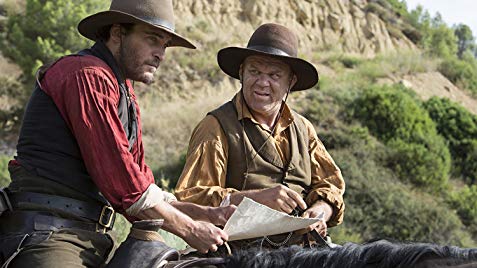Their latest assignment puts them on the trail of Herman Warm (Riz Ahmed), a chemist who formerly worked for the Commodore but has since run off. The Commodore is shown to be a shrewd and careful man, and as good as the Sisters brothers are, more eyes looking for Warm are better, so he also sends John Morris (Jake Gyllenhaal) after the chemist. John finds Warm long before the Sisters brothers, but he’s charmed by Warm’s optimism and his knowledge, which includes that formula for a substance that, when poured into a creek, glows when it comes in contact with trace amounts of gold. They partner up in hopes of starting an egalitarian Texas society with the proceeds from Warm’s formula, as long as they can evade the Sisters brothers and make their dreams come true.
Audiard has long come back to a theme in his film’s of choice, such that he and writing partner Thomas Bidegain create characters stuck in bad cycles and present them with an opportunity to make a different decision. One doesn’t have to endlessly submit to the same ways of thinking. This recurs in The Sisters Brothers for each of the main four characters, up to them outright interrogating their own behavioral patterns for root causes. Charlie, a drunkard as well as a brute, puts his anti-social actions on his and Eli’s abusive father and the rotten blood that he passed on to them. He couldn’t pass up this job or put down that shot of whisky anymore than he could replace his genes. Eli sees this as a self-mythologizing excuse regarding a father who was merely a drunk, and everything that goes with it. Their upbringing was the same, but he has few of Charlie’s weaknesses and neuroses, implying that he could choose to emulate his brother instead of his father at any turn. Morris, too, is intrinisically searching for a way out of his mercenary existence, a thing that he can’t mentally break free from until an economically and morally better opportunity presents itself.
On their way to various revelations, Audiard puts his characters through a level of survivalist body horror that belies how funny much of The Sisters Brothers otherwise is. Not infected with an American romanticism of the West, he can show how damnably unpleasant and dangerous an unprotected life can be. Lost limbs, frontier surgery, and both large and small attacking animals make each step a fraught one. Amidst some repugnantly inventive infections and infestations is some strong comic rapport, particularly between Reilly and Phoenix. Reilly can’t play against another male actor without evoking his relationship with Will Ferrell, and he and Phoenix capture some of the fraternal rivalry of Step Brothers, not a film I expected to be reminded of in a Western. Reilly is a comic genius capable of turning a flat script into gold, and sadly, that gift is required from a script that often veers into the expositional and the staid. He puts a little mustard on lines where he can, and his chemistry with a game Phoenix who’s practically forming his Joker character is obvious, but a better script would surely have further elevated their work.
Lackluster script notwithstanding, The Sisters Brothers entertains in its small moments and surprises in its grand plot swings. A left-field cameo at the end and the epilogue to go with it even leaves the viewer with a sweet taste in their mouth, despite an earlier scene where a character vomits spiders from his. The Sisters Brothers is a step down from Audiard’s A Prophet and Rust and Bone heights, but his being able to attract this level of talent to a project bodes well for his future working in America. He’ll hopefully have less production companies to thank in his next outing. B

 RSS Feed
RSS Feed